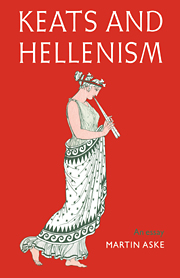Summary
Endymion sustains and elaborates that compensatory movement initiated by the language of flowers in ‘I stood tip-toe upon a little hill’. I have suggested that the earlier poem is somehow generated from the sense of loss announced in the dedicatory sonnet with which it is, at the beginning of Poems, juxtaposed; thus Endymion might be read as a further stage in this movement. As a narrative written out of a lack, it establishes itself as the story of ‘leafy luxury’ which ‘I stood tip-toe’ endeavoured but failed to be.
We have already seen how the Preface to Endymion ends on a note of valediction, and potential loss : ‘I hope I have not in too late a day touched the beautiful mythology of Greece, and dulled its brightness : for I wish to try once more, before I bid it farewel.’ It may be, then, that the tension existing between the Preface's conclusion and the poem proper repeats the tension between ‘To Leigh Hunt, Esq.’ and ‘I stood tip-toe’ – Keats's ambitious ‘test of Invention’ will be secretly motivated by the same recuperative, compensatory drive as ‘I stood tip-toe’ had been. Indeed, Keats's fear of tarnishing the lustre of the ancient fictions is the most powerful and conclusive symptom of a lack of confidence which characterizes the Preface as a whole, and for which the narrative itself immediately sets out to compensate.
- Type
- Chapter
- Information
- Keats and HellenismAn Essay, pp. 53 - 72Publisher: Cambridge University PressPrint publication year: 1985

